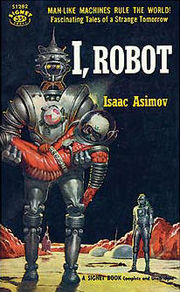i, robot: good robot or bad robot?
"I, robot" (originally from Asimov) means the robot has acquired consciousness.

This is what a Cory Doctorow robot (2005) does:
This is how an Isaac Asimov robot (1942) is expected to behave:
Cory Doctorow wrote his version of I, Robot as a challenge to Isaac Asimov's Three Laws of Robotics, which he describes as "totalitarian assumptions underpinning some of sf's classic narratives" (see footnote to previous URL)
I'm for Cory. Why should we conceptualise future robots as inferior to humans and requiring a special set of laws to keep them in a subservient position. The more likely outcome in the future is that robots (thinking machines) will become superior to humans in all respects (smarter and faster). It is also likely that co-evolution will occur: part human, part robot.
Always being nice in a menial sort of way comes across as phoney and uninteresting, as is also depicted in Cory's short story:

This is what a Cory Doctorow robot (2005) does:
Benny (a robot) tossed the Social Harmony man across the room into the corner of a desk. He bounced off it and crashed to the floor, unconscious or dead.
- I, Robot by Cory Doctorow
This is how an Isaac Asimov robot (1942) is expected to behave:
1. A robot may not harm a human being, or, through inaction, allow a human being to come to harm.
2. A robot must obey the orders given to it by human beings, except where such orders would conflict with the First Law.
3. A robot must protect its own existence, as long as such protection does not conflict with the First or Second Law.
- Isaac Asimov's Three Laws of Robotics
Cory Doctorow wrote his version of I, Robot as a challenge to Isaac Asimov's Three Laws of Robotics, which he describes as "totalitarian assumptions underpinning some of sf's classic narratives" (see footnote to previous URL)
I'm for Cory. Why should we conceptualise future robots as inferior to humans and requiring a special set of laws to keep them in a subservient position. The more likely outcome in the future is that robots (thinking machines) will become superior to humans in all respects (smarter and faster). It is also likely that co-evolution will occur: part human, part robot.
Always being nice in a menial sort of way comes across as phoney and uninteresting, as is also depicted in Cory's short story:
"Acknowledged. It is my pleasure to do you a service, Detective"To think that humans will always be superior or even want to be talked to like this is a totalitarian assumption. What Cory has done is challenge that assumption through a short SF story.




0 Comments:
Post a Comment
<< Home